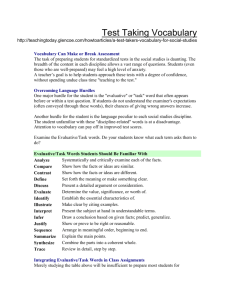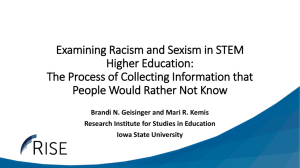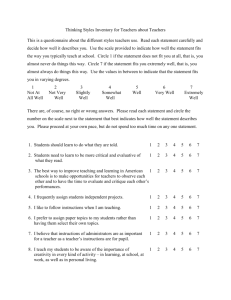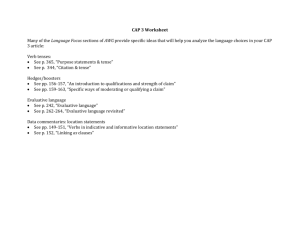Prospects for the Evaluative State.
advertisement
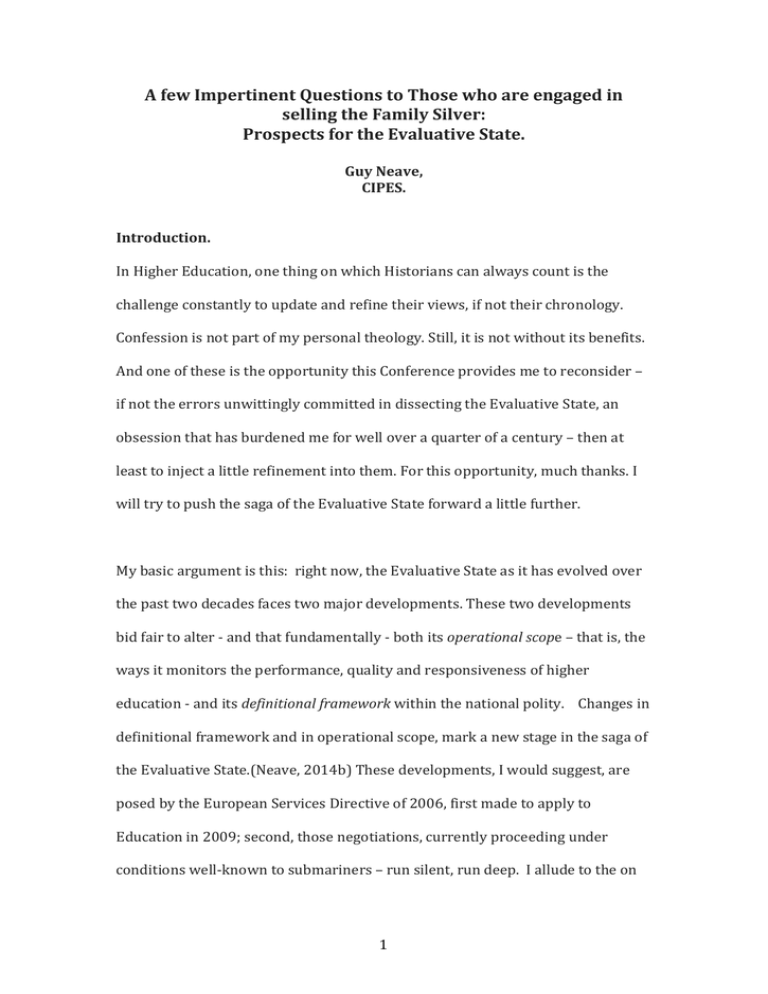
A few Impertinent Questions to Those who are engaged in selling the Family Silver: Prospects for the Evaluative State. Guy Neave, CIPES. Introduction. In Higher Education, one thing on which Historians can always count is the challenge constantly to update and refine their views, if not their chronology. Confession is not part of my personal theology. Still, it is not without its benefits. And one of these is the opportunity this Conference provides me to reconsider – if not the errors unwittingly committed in dissecting the Evaluative State, an obsession that has burdened me for well over a quarter of a century – then at least to inject a little refinement into them. For this opportunity, much thanks. I will try to push the saga of the Evaluative State forward a little further. My basic argument is this: right now, the Evaluative State as it has evolved over the past two decades faces two major developments. These two developments bid fair to alter - and that fundamentally - both its operational scope – that is, the ways it monitors the performance, quality and responsiveness of higher education - and its definitional framework within the national polity. Changes in definitional framework and in operational scope, mark a new stage in the saga of the Evaluative State.(Neave, 2014b) These developments, I would suggest, are posed by the European Services Directive of 2006, first made to apply to Education in 2009; second, those negotiations, currently proceeding under conditions well-known to submariners – run silent, run deep. I allude to the on 1 going haggling over the so-called North Atlantic Free Trade Area between Bruxelles and Washington. Naturally, they are “under wraps” doubtless to avoid embarrassment to the “sherpas” – those unsung heroes who bear the burden of negotiation - or to dilute the dismay of those who, on the eventual unveiling of the fait accompli, may see themselves as having been ‘sold down the river’. There are, however, some pointers towards what we may expect. At the moment, these appear more as ‘soundings’ – or, to use another metaphor, ‘testing the water’ in developments currently agitating the English edition of the “Evaluative State.” The Principle of Legal Homogeneity. Before we can focus on these two issues, we should step back a little. We need to examine the dynamic of the Evaluative State itself. More particularly, we need to see how the Evaluative State both fits in with and complements the classic legally-based construct that has long shaped higher education in Europe, sometimes described as the principle of “Legal Homogeneity”. (Neave and van Vught, 1991) Legal Homogeneity defines the legal status, gives broad definition and imparts recognition to the way the higher education system is to operate across the national territory. Legal homogeneity provides the definitional framework. It lays out the relationship between higher education’s component bodies and the responsibilities they bear. Typical examples of this construct would be, for instance, in France the 2007 Law on the New University (Law of August 10 2007). It hit the statute book one short month before Portugal promulgated Decree Law 67/2007 on the Legal Framework of Higher Education Institutions. 2 By definition, the principle of Legal Homogeneity is an a priori enactment. It expresses the legislator’s intent or, in today’s terminology, it sets out the means by which the objectives it contains, are to be addressed. It serves as a definitional framework. However, it makes a number of assumptions. It presumes a relative homogeneity in what may be termed the “speed of take-up”. Since it deals with higher education on a sectorial basis, it also presumes the capacity of take up to be similar within each sector – public, private, university or polytechnic. Whilst Legal Homogeneity functions as an input factor, the Evaluative State, comme son nom l’indique, concentrates on output. (Neave, 2012) In short, whilst Legal Homogeneity sets out the definitional frame factors within which quality, performance, efficiency – even enterprise (Neave, 1988) - may be fulfilled within the appropriate sector, the Evaluative State verifies how far these targets have been met. The Evaluative State in effect operationalizes the overall principles and objectives of policy, set out by legal enactment into replicable, quantifiable and verifiable form. This it does on the basis of multiple indicators or their surrogates, standards set or benchmarks laid down, which it brings to focus on the individual institution within each sector. Features of the Evaluative State. 3 There are three essential features of the Evaluative State: first, it is specifically tailored to deal with higher education; second, it functions in an a posteriori mode; third, it lends itself to a high degree of disaggregation and, though more rarely, of re-aggregation. In fine, the Evaluative State provides the operational scope. Individual universities and polytechnics and, in a less technical form, the public in general, may judge institutional performance and if necessary consolidate or take new initiatives either to reaffirm their position or to improve on it. Or, in the case of the public, to adjust their choice of establishment for themselves or their children. When placed together as complementary to one another, Legal Homogeneity and the Evaluative State together inject a key feature into higher education policy. This key features is conditionality, though how far institutional performance is directly tied into public financing, not surprisingly, varies from country to country. To be mischievous, Legal Homogeneity and the Evaluative State are today, two sides of the same coin. Together, they ensure what the more frivolous amongst owners of personal computers and students of higher education might call “the Macintosh function” of higher education policy: The Evaluative State ensures that what you see in public statements about higher education policy is indeed what you get.” And woe betide the laggards. Or, if you prefer a more classical injunction, “Vae victis!” 4 Conditionality: a key concept. Yet, conditionality is very far from being confined to the budgetary dimension alone, though clearly the budgetary dimension stands well to the fore since 2008 and in certain Member States of the European Union even before. In the case of the United Kingdom, financial embarrassment, which first reared its head in the “cuts” of 1981, (Kogan and Kogan, 1983) was one of the prime drivers towards the particular British version of the Evaluative State. However, if we look carefully at the long-term significance of the Evaluative State, it is clear as the day is long that the most powerful form of conditionality operates in parallel to the threat or the fact - which is worse – of monetary chastisement. This it does on a very different plane. This plane is an essential element in a World Higher Education order. (Neave, 2014) In the words of the American sociologist of higher education, the late Burton R Clark, it is the “gold coin of academic excellence,” (Clark, 1983) - that is, an institution’s claim to standing and repute. Though rank ordering of Higher Education Institutions is very far from being universal – indeed, Portugal stoutly refuses to yield to this temptation – League Tables are but one aspect of a far broader phenomenon. From its earliest days, rank ordering has become the pointer to both national and institutional competitiveness. Its pursuit was –and remains - a powerful lever in the Evaluative State. 5 Functions fulfilled. Whilst both purpose and techniques have undergone marked change over the past decade and a half, in its early form the Evaluative State fulfilled two central functions: it made public and explicit that implicit knowledge the world of learning has always had of itself. The Evaluative rendered account to the public of how higher education – as a public and collective good and as an axial institution in national life (Henkel, 1991, 2007) - performed. The Evaluative State revealed to the public the basis for the substance – or absence - of institutional standing, esteem and repute. Second, the Evaluative State redrew the relationship between higher education, national administration and the polity by offloading certain detailed responsibilities to universities, the better to enable national administration to focus less on daily detail than on broad strategy. Such motives were present in the Netherlands, France and, as you know far better than I, in Portugal in the early 90s. To some students of higher education, the Evaluative State was thus the child of the “offloading State”. (Neave and van Vught, 1994) Britain: singular as usual. 6 In this, however, the United Kingdom stood apart. The British edition of the Evaluative State, far from “offloading” the burdens of central administration onto higher education, drove in the opposite direction. The British version of the Evaluative State was the means to shape a regulated market. This it did through setting out further national frame factors around higher education. In place of a confederation of universities that had long enjoyed a very high degree of individual institutional autonomy, the British Evaluative State itself served as the vehicle for moving towards a multi agency-driven system, based on national frame factors, standards and benchmarking. The British Evaluative State thus became the detailed instrument of central agency oversight. Mrs Thatcher and her successor administered “the firm smack of government” to higher education. Thus, they discovered the lost virtues of the ghost of the Great Napoleon at the very moment France sought to exorcise him. (Neave, 2012, pp) The Nub of the Issue. That said, we now come to the nub of the issue. In how does the European Directive on Goods and Services impinge on the Evaluative State? The importance of the Services Directive lies in at least two aspects: first, its current interpretation, second, its function as a policy procedure. As currently interpreted by the services of the EU Commission, certain types of higher education provision fall under the definitional framework governed by the freedom to circulate for goods and services. Branch campuses or franchise arrangements located in third party countries with courses and diplomas accredited by a foreign “exporting” establishment fall under this rubric 7 A recent study, carried out for the Commission with amazing speed, suggests there are some 253 establishments in this situation. (Brandenberg et al, 2013) What impresses, however, is neither the speed nor the numbers. What is striking is the Commission’s interpretation, which echoes an earlier UNESCO definition, namely that responsibility and accountability for the quality and accreditation of “service” provided are in effect extra-territorial. They are vested in ‘the exporting’ university or providing firm. By contrast, responsibility of the territorial authority is to ensure that its procedures neither infringe, nor are incompatible with, conditions that uphold the freedom of goods and services to circulate. Given the numbers of branch campuses or franchise arrangements set against the 4500 or so higher education establishments in Europe of the 28, one might argue that this is little more than a storm in a teacup. In Europe foreign-based, private for profit HEIs are, by any criterion one cares to name, few and far between. Impact on Operational Scope. Taken at face value, the implications the Service Directive has for the operational scope of the Evaluative State are fraught indeed. They bid fair to create a dual system of Accreditation, Quality and Accountability. On the one hand, the territorially-based system that has evolved around higher education defined as a collective public good. On the other, a cross national, extra territorial construct 8 designed to cater for higher education cast as a private, profit generating commodity, where control and authority are either institutional, corporate or both. In short, there is a new definition to the higher education market. At the very least, this is an ambivalent arrangement. It is also at odds with that principle fundamental to the operational procedures of the Evaluative State, which are vested in agencies formally and legally independent both from government and from the establishments it monitors, though this certainly does not exclude the presence of representatives of both stakeholders. In the second place, having the “seller” underwriting quality stands as an amazingly egregious example of violating that age old commercial principle which, not without coincidence, the Evaluative State was, in part, set up to remedy, to wit “Caveat Emptor”. On the contrary, when applied to cross border higher education, the seller of the family silver appears to have the privilege of guaranteeing his own hallmark. It is a sleight of hand the Evaluative State rigorously denies its nationals. This is a worrying situation and most certainly so now that students are conceived as “consumers” in the Knowledge Society. Added to being both judge and jury, extra-territoriality also presumes that Quality of the “service” it provides is independent of the culture to which it is delivered. Distinctions. Theoretically clear: in practice, very clouded. Still, the supporter of higher education as the basic saleable commodity in the Knowledge Society, would argue, the European Service Directive deals only with 9 higher education as an “exported good”. Moreover, it does draw an ostensibly clear line between services of General Interest and services of General Economic Interest. The former is funded from public monies. The latter draws on private finance. Its purpose is to make a profit. Such a distinction appears clear. In point of fact, the current dynamic that drives higher education over the past two decades ensures quite the contrary. Even universities long recognized as public are actively encouraged to seek alternative money streams, a dire necessity made ever more pressing by persistent “budgetary compression”, sovereign debt and by EC policies of austerity. Nor, can it come as greatly surprising that certain establishments, once public, now opt out of this category. Behind this phenomenon stands another issue. It is equally important as the once clear line between public and private higher education, begins to blur. When do resources conjured up from contracts, from services rendered to firms and corporations by formally designated public sector establishments, become profit? Is there in fact an essential difference between profit in private sector higher education and revenue in public establishments? How is it to be defined? As a percentage of annual income? Is there a notional – and for that matter an agreed – threshold at which point a public university on the basis of its annual ‘take’ tips over to become a de facto private sector establishment by dint of having made a surplus – or ‘profit’? The Services Directive is curiously silent on this. Growing Ambiguity. 10 Yet, these are not idle questions. Already, in the United Kingdom, some universities derive more of their annual money flow from non-public sources than from the public purse. And in the scheme of things outlined in the European Services Directive, where are the exporter universities – those seeking to establish profit-making franchise arrangements or branch campuses abroad – to fit? Whilst their foreign branches would appear, in the view of the European Commission, to benefit from the freedom to “trade” outside their home country which also presumes their branches are “for profit” establishments, there remains a certain ambiguity of status vis a vis the national definition laid upon the home base establishment. Public at home, private and for profit abroad is far from unknown in the United Kingdom. Put succinctly, extending the European Services Directive to higher education – limited and marginal though it might be now - introduces a fundamental ambiguity in the operational scope of the Evaluative State. Changing the Definitional Framework: bis repetita placent? This brings me to my second point about the impact of the Service Directive on the Evaluative State. This is the Directive’s role in forwarding policy. If we look very carefully at the unfolding relationship between Member States and European Commission in the field of higher education, the European Service Directive in a curious way, builds on an older precedent. In effect, the European Service Directive is not the first time, the Commission has had recourse to shifting the definitional framework of a policy domain as a means of expanding 11 Commission scope and initiative. The Gravier judgement, handed down in 1987 by the European Court of Justice did just that. Redefining all higher education as vocational, the Court effectively ‘gave higher education a treaty basis’ and thus the legal power to launch the major mobility programmes for students and staff - COMMETT, ERASMUS and later SOCRATES and MARIE CURIE. The End Game. There is evidence, both from Portugal and also from Slovenia, that the Commission is laying the groundwork for an alternative definitional framework for higher education, using franchise arrangements and branch campus exported abroad as the fer de lance for what cannot but be the de facto commodification of higher education. The question that must, for the moment, remain unanswered is: when and under what particular circumstances, the occasion will present itself for evidence the Commission is gathering, to be laid before the European Court of Justice. The key issue that would be engaged, were matters to reach a pass such that a formal judgement was required, is no less delicate. For the Court would, like as not, have either to decide between which of the two contending definitional frameworks is to be upheld, or, as an alternative possibility, how they may be reconciled. The Importance of John Bull’s Island. So far, I have concentrated on the implications for the Evaluative State posed by the European Services Directive. Let me now turn to some recent developments 12 in the United Kingdom. As Sociologists know full well, there is much to be learned from the deviant case. And, as I pointed out earlier, the dynamics of the English Evaluative State may be viewed in precisely such a light. For whilst on the mainland, the imperatives of Neo Liberalism and New Public Management infiltrated the Evaluative State incrementally and over time, in Britain the Evaluative State was itself the prime instrument for injecting them into higher education. There is, however, another reason for paying attention to what is happening in John Bull’s Island. Not only was it the first higher education system in Europe to embark on the process of “marketizing” higher education. Britain was amongst the earliest to draw upon foreign student traffic as an additional income source, a policy that has been in place since the late 1970’s early 1980s. Increasingly, however, attention has focussed on exporting British diplomas abroad. Britain is one of the rare countries specifically to review and validate those programmes, courses and diplomas, which its universities intend to export. The question is not whether British diplomas are officially recognized by the home authority. Most of them are, though there are always scandalous exceptions. The issue is more subtle. It is whether the British style and techniques of evaluation are, in the much overused phrase, “fit for purpose” when set against the criteria upheld in the receiving state? Or, to put matters more bluntly still, whether pedagogic styles and assumptions about learning and disciplinary content current in England correspond to those in the land and institution of reception? In short, whether the judgement of the English Evaluative State is to substitute 13 for the evaluation methods and criteria employed in – say, Portugal in the event, for instance, that the University of Moreton-in-the-Marsh decides to build an “international profile” for itself by opening a private, for-profit branch campus in Braga? The English Debate. Current debate in England raises other questions about the operational scope of the Evaluative State. More specifically, it poses a question that may well have resonance elsewhere. It is this: is Quality Assurance more effectively upheld and advanced by a single Agency? Since 1997, the Quality Assurance Agency, a company with charitable status and independent of government, has exercised responsibility over external quality assurance. It advises government on whether to give degree-granting powers to individual institutions. (Williams, THE, October 16-22nd 2014) Since 2002, it has built up a unified system of institutional reviews. They assess how individual universities manage academic quality and deal with the standards of the education they provide. It is, in effect, an exercise stable, tested and tried. The crux of the current uproar is whether external review of quality management ought to be “outsourced” to private companies, government agencies, charities, other public bodies or quality assurers from industry, the latter being seen as an option for such disciplines as Engineering and Management. (THE, October 9th – 15th 2014) Other proposals add to the options being canvassed which, if taken up, would severely curtail the operational scope 14 of the English Evaluative State. The most significant of these, to my mind, is the suggestion floated by a Think Tank, the Higher Education Policy Institute. It calls for individual universities to have the freedom to choose from a number of accreditation bodies. The justifications for these proposals merit attention, though one should also bear in mind the very specific – if not deviant- nature of the English Evaluative State when viewed from mainland Europe. One of the more interesting lines of argument is that universities, which no longer derive the major part of their monies from the public purse, should have the freedom to have their quality assessed and be accredited by bodies that themselves are non-public. This line of argument casts the Quality Assurance Agency aside on grounds of its monopoly status. And in a world that values enterprise, competition and entrepreneurship, monopolies are sui generis undesirable. The operational scope of the Evaluative State thus faces the prospect of being broken up into a multiplicity of interests, each contending for the job, more reactive and, so some claim, less costly. In other words, de facto institutional privatization, as defined by income source, calls for the privatization of the Evaluative State. Thus, two decades after discovering Napoleon, some of our British colleagues would, apparently, like to return the Corsican Ogre to his residence on Ascension Island! Surreal though the brouhaha may seem, nevertheless it raises a number of questions we may wish to pursue further. Foremost amongst them, since it is also posed, though in a slightly different form, by the European Service Director, is this: Are Quality and Accreditation better advanced by single, functionally 15 defined and territorially-based agencies? Or do national standards, goals and ambitions move ahead when placed in the hands of fragmented bodies paid by the results they are ready to come up with? Envoi. Much remains obscure in the British debate about the future of the Evaluative State. There is much noise about ‘driving up quality’, about higher education changing and about the need for quality to change, too. But, I am by no means convinced that such Anglo Saxon attitudes are for home consumption alone, despite the looming of a General Election next year. One possible clue to this riddle comes in the proposal that universities should be able to choose between different instances for Accreditation and Quality Assessment. It is, surely, no coincidence that this arrangement echoes one of the basic features of American higher education, which draws on semi public regional accreditation boards. Whether this signal is better understood when set against the negotiations taking place between Bruxelles and Washington, only time will tell. Nor is it merely a matter of chance that those countries where the commodification of higher education and the indebtedness of their students in consequence, is most advanced are the United States and Britain. It remains to be seen whether the interest of both would not potentially be as well served by the European Commission pushing forward on the Service Directive. If this should happen 16 then, as I have argued earlier, our current thinking about the Evaluative State will be tested to the utmost. Thank you for your attention. (3889) References: Brandenburg Uwe, McCoshan, Andrew, Bischof Lukas, Kreft Anne, Storost Ulrike, Leichsenring, Hannah, Neuss Frederic, Morzick Britte, Noe Sabine (2013) Delivering Education across Borders in the European Union, Bruxelles, Publications Office of the European Union. Brown, Roger. (2014) “Single watchdog is better than several,” Times Higher Education, October 16 – 22nd Clark, Burton R (1983) Higher Education System: Academic Organization in Cross National Perspective, Berkeley/ Los Angeles/ London, University of California Press. Henkel, Mary (1991) “The new Evaluative State,” Public Administration, 69, 1, pp. 321 – 336. Henkel, Mary (2007) “Can academic autonomy survive in the Knowledge Society? A perspective from Britain,” Higher Education Research and Development, 26, 1, pp. 87 – 99. Kogan, Maurice and Kogan, David (1984) The Attack on Higher Education, London, Kogan Page. Neave, Guy (1988) "On the cultivation of quality, efficiency and enterprise: an overview of recent trends in higher education in Western Europe 1986 - 1988", European Journal of Education, vol. 23. Nos. 2-3, 1988, pp. 7 - 23. Neave, Guy (2012) The Evaluative State, Institutional Autonomy and Reengineering Higher Education in Western Europe: The Prince and his Pleasure, Basingstoke/ New York Neave, Guy (2014a) “International Relations: a Central Business” in Pedro Teixeira (Ed) Percursos da Internacionalização na Universidade do Porto Uma visão centenária, Porto University Press, pp.171 – 235. Neave, Guy (2014b) “Quality Enhancement: a new step in a risky business?” in Maria João Rosa and Alberto Amaral (Eds) Quality Assurance in Higher Education: contemporary debates, Basingstoke/ New York, 2014, Palgrave, pp. 32 – 52. Neave, Guy and van Vught, Frans A. (1994) Prometeo Encadenado: estado y educación superior en Europa, Barcelona, Gedisa. 17 Williams, Peter (2014) “Call to arms: are we on the brink of yet another Quality War?” Times Higher Education, October 16 – 22nd “Watchdog no match for a sector in flux,” Times Higher Education, October 916th 2014. 18

